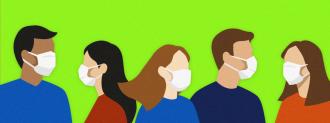While men and women are about as likely to get COVID-19, the coronavirus doesn’t affect the sexes equally — globally, men account for 60% of COVID-19 deaths, and some places have reported men dying at double or even quadruple the rate of same-aged women.
If researchers can figure out why this is, they might be able to use the information against COVID-19 — tailoring treatment plans to account for sex might produce better coronavirus patient outcomes, for example.
Some researchers think behavioral and social differences between the sexes are the primary cause of the discrepancy — men are more likely to smoke tobacco and have pre-existing health conditions, for example.
Others, however, believe biology can explain the harsher impact of the coronavirus in men. Blood and hormone studies have already produced evidence of this, and now, researchers from Yale University have uncovered some clues in the immune system directly.
Clues In the COVID-19 Immune Response
For the study, published in the journal Nature, the Yale researchers collected blood, saliva, urine, and other samples from 39 hospitalized COVID-19 patients and 59 healthy people.
When they analyzed the samples, they found key differences in men and women’s COVID-19 immune response, particularly when an infection was just starting to take hold.
One difference had to do with a type of white blood cell capable of recognizing and killing viruses. These infection-fighters, known as “T cells,” showed up in higher levels in the female COVID-19 patients — and the older a male patient, the worse their T-cell response.
These differences may underlie heightened disease susceptibility in men.
Akiko Iwasaki
“When (men) age, they lose their ability to stimulate T-cells,” researcher Akiko Iwasaki told the New York Times. “If you look at the ones that really failed to make T-cells, they were the ones who did worse with disease.”
Another difference between male and female patients’ COVID-19 immune response involved a type of protein that spurs the immune system to act. If these proteins, called “cytokines,” build up in the body, they can actually hurt a patient, causing what’s known as a “cytokine storm.”
The Yale researchers found higher cytokine levels in the male patients early on in their infections, which could suggest that men are more likely to experience a storm-causing excess of them later.
Improving Coronavirus Patient Outcomes
The next step is using this information about the COVID-19 immune response in men and women against the virus, according to Iwasaki.
“We now have clear data suggesting that the immune landscape in COVID-19 patients is considerably different between the sexes and that these differences may underlie heightened disease susceptibility in men,” she said in a news release.
“Collectively, these data suggest we need different strategies to ensure that treatments and vaccines are equally effective for both women and men,” she continued.
One shot of a vaccine might be enough for young women, while older men might need three.
Marcus Altfeld
This might mean keeping a closer eye on men for high T-cell levels soon after an infection takes hold.
It might also mean vaccinating the sexes differently — one of the ways vaccines protect against viruses is by spurring the creation of T-cells, so men might need higher doses given that their immune systems are naturally less adept at the task.
“You could imagine scenarios where a single shot of a vaccine might be sufficient in young individuals or maybe young women, while older men might need to have three shots of vaccine,” Marcus Altfeld, an an immunologist at the Heinrich Pette Institute who wasn’t involved in the study, told the New York Times.
We’d love to hear from you! If you have a comment about this article or if you have a tip for a future Freethink story, please email us at tips@freethink.com.






